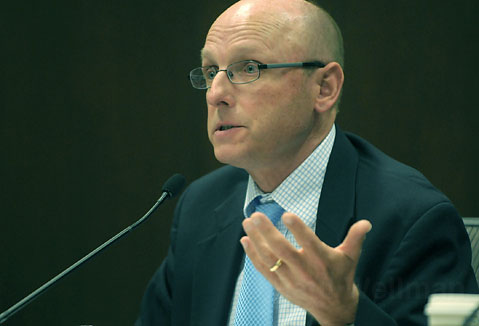Grant-Standing
Councilmember House Warns Against Regulating Dispensaries Out of Existence

For Santa Barbara City Councilmember Grant House, the Ordinance Committee has become as much a curse as it is an assignment. On that committee, House has spent the past year-and-a-half wrestling with the issue of medical marijuana. It’s not getting any easier. During House’s tenure, fellow committee members have come and gone. Santa Barbara has witnessed a violent sea change in public attitudes toward medical pot. Gone is the open embrace of “compassionate care.” In its place now radiates a fevered concern about the easy corruptibility of Santa Barbara’s youth. The push for ever tougher restrictions — from galvanized parents, angry school administrators, and a legion of sober-living advocates — has been all but irresistible. But House continues to try. For him, dispensaries are not the get-rich-schemes — and their owners the cynical hustlers — that their critics contend. “What I really see is that people have to be able to get relief for their suffering,” House said.
What worries House most is that his council colleagues — trying to curb abuses associated with some dispensaries — might regulate legitimate operators right out of existence. “What happens then?” he asked. “People with real needs will be forced to get relief by hanging out with honest-to-god drug dealers, people selling meth, cocaine, you name it.” House spent months last year crafting a series of regulations designed to severely regulate how dispensaries conduct their business. Just as the ink dried, however, Councilmember Dale Francisco questioned whether any retail dispensary operation could be deemed legal under California’s admittedly murky rules and regulations. Under state law, nonprofit and collective dispensaries can operate without fear of criminal sanction. But can medical marijuana be legally sold? The Los Angeles District Attorney says no. But the California Attorney General has opined that all sales must be taxed; how could it be illegal, House has demanded, if it is to be taxed?
This past Tuesday, House spent an hour and a half at the Ordinance Committee, attempting to bat down suggestions for new operational restrictions proposed by fellow Councilmember Frank Hotchkiss. He argued against a proposal that would ban dispensaries anywhere downtown, contending that fantasies of hookah-filled casbahs were sorely at odds with the reality of most dispensaries. House argued against another proposal to ban dispensaries within 500 feet of the YMCA; that, he said, would put an existing dispensary on the 3700 block of State Street — with an unblemished track record — out of business. Likewise, House opposed a proposal to limit dispensary members to Santa Barbara County residents. Hotchkiss explained he was trying to prevent Santa Barbara from becoming a tourist destination for potheads. House objected that if people from out of town could have their prescriptions filled in Santa Barbara pharmacies, then people with medical marijuana cards should be afforded the same access. Mostly, House was adamant that Santa Barbara not adopt any language that banned the exchange of medical marijuana for cash. That, in turn, begged the broader question of what constitutes “reasonable compensation” under the poorly defined parameters of state law.
House concedes that some dispensaries have abused the privilege. Even so, he remains mystified by the sudden shift in public perception. In the meantime, House’s work with the Ordinance Committee on medical marijuana is far from over. He’ll meet again in two weeks to hash over the details some more. Any eventual ordinance remains months away from adoption. This November, state voters will be asked for the first time to cast ballots on an initiative that would legalize marijuana for recreational purposes — allowing local communities to tax as well as regulate it — and not just decriminalize it for medicinal uses. Recent polls suggest the initiative enjoys 56-percent approval ratings, and its backers have already vowed to spend $20 million courting the politically strategic soccer-mom voting bloc. If House thinks the council should hold off pending the statewide vote — as some council members have privately suggested — he’s not saying so. “I don’t think it affects anything right now,” he said. “What difference that might make down the road remains to be seen.”



